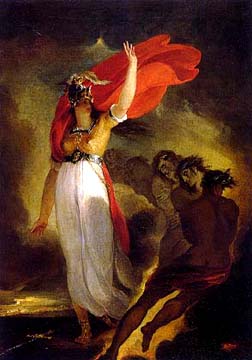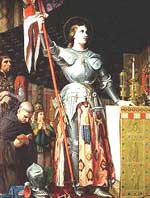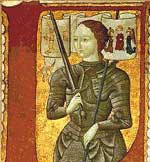|
The maid of Orleans
 At the time of Joan's childhood the land of France was caught up in the Hundred Year's War. Joan's home town of Domremy was placed somewhat in between the forces of the English and the French. Although Joan had a relatively pleasant and simple childhood, occasionally she and her family had to flee from armies passing through their town.
At the time of Joan's childhood the land of France was caught up in the Hundred Year's War. Joan's home town of Domremy was placed somewhat in between the forces of the English and the French. Although Joan had a relatively pleasant and simple childhood, occasionally she and her family had to flee from armies passing through their town.
Joan started hearing voices at the age of 13. These voices originally only exhorted her to pray often and attend church. After a year or two they started telling her that she must help the dauphin, or future king, of France be crowned. The dauphin, Charles VII, had to be coronated at Reims by tradition, but at that time Reims was held by the English, with their own hopes of crowning Henry VI, who was but a child, when he was old enough.
Joan left her home town without telling her parents and managed to get to the King and convince him of the sincerity of her mission. She was supplied with an army to raise the siege of Orleans, the first necessary step to reaching Reims. Despite the bumbling and lack of faith of her fellow commanders, the siege was lifted with full credit going to Joan. From there it seemed that Joan could do no wrong in battle until she reached Reims and the King was coronated. After this, Joan's successfulness started declining, mainly thanks to the lack of monetary support from King Charles VII. She was captured at Compiègne when the drawbridge was raised too hastily, resulting in Joan being left outside.
Joan was tried by an English inquisition court, found to be heretical, and burned at the stake.
 Perhaps one of the most distinguished, and most often forgotten, creative contributions of Joan of Arc was Joan's patriotism. Before Joan, there was no sense of "France" or "English." To the people of her time, those words meant only the actual land of France and England, not the nations. Joan was the first leader to consider those two countries separate. Even the dauphin and future king of France, Charles VII, felt uneasy about his claim to be the King since Henry VI also claimed the same position. Until Joan, the possibility that there might be two kings was not seriously considered. Either Henry VI was the King of France and England, or Charles VII was. With Joan came the sense of nationalism for the French.
Perhaps one of the most distinguished, and most often forgotten, creative contributions of Joan of Arc was Joan's patriotism. Before Joan, there was no sense of "France" or "English." To the people of her time, those words meant only the actual land of France and England, not the nations. Joan was the first leader to consider those two countries separate. Even the dauphin and future king of France, Charles VII, felt uneasy about his claim to be the King since Henry VI also claimed the same position. Until Joan, the possibility that there might be two kings was not seriously considered. Either Henry VI was the King of France and England, or Charles VII was. With Joan came the sense of nationalism for the French.
Joan drove home her viewpoint with the English during her trial. She was often asked whether God loved France more than England. Joan prudently responded that God wanted the English to stay in their own lands.
 Above all, Joan was a devout catholic. The main reason she was unwilling to submit to church authority during her trial (which actually became the main accusation during her trial--her unwillingness to submit to the church) was because she was being held by the English, not the church. When asked if she would submit to her judges, who promoted themselves to be in authority from the church (but were really just English dupes), Joan replied, "I will answer you. On submission to the Church . . . I have said that all the works which I have said and done should be submitted to Rome to our lord the supreme pontiff, to whom, after God, I refer myself. And as for my words and deeds, I did them on behalf of God." On her way to be burned, she told her main prosecutor, Cauchon, "Alas! If you had put me in Church prisons and in the hands of competent and suitable Church guards, this would not have happened; that is why I appeal to God about you."
Above all, Joan was a devout catholic. The main reason she was unwilling to submit to church authority during her trial (which actually became the main accusation during her trial--her unwillingness to submit to the church) was because she was being held by the English, not the church. When asked if she would submit to her judges, who promoted themselves to be in authority from the church (but were really just English dupes), Joan replied, "I will answer you. On submission to the Church . . . I have said that all the works which I have said and done should be submitted to Rome to our lord the supreme pontiff, to whom, after God, I refer myself. And as for my words and deeds, I did them on behalf of God." On her way to be burned, she told her main prosecutor, Cauchon, "Alas! If you had put me in Church prisons and in the hands of competent and suitable Church guards, this would not have happened; that is why I appeal to God about you."
Joan's devotion to religion, despite her military career, were truly remarkable. She even required that her soldiers be "well confessed and repentant and of good will." Joan also stopped in every town she passed through, when it was possible, so she could attend mass.
|





 View movies from the Middle Ages
View movies from the Middle Ages 

